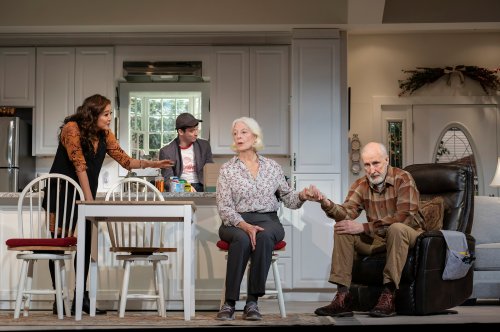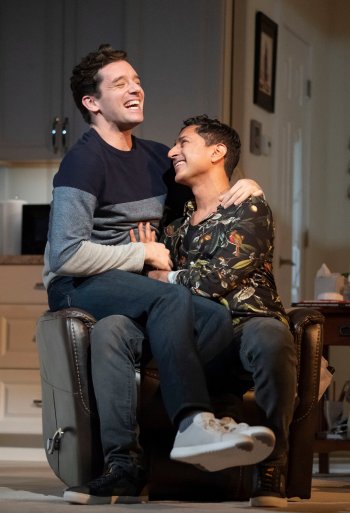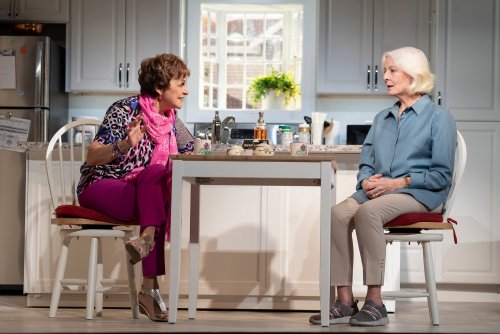Grand Horizons
After a brilliant beginning, playwright Bess Wohl's family comedy settles for pretty good.

Ashley Park, Michael Urie, Jane Alexander and James Cromwell in a scene from Bess Wohl’s “Grand Horizons” at The Helen Hayes Theater (Photo credit: Joan Marcus)
Bess Wohl’s Grand Horizons opens with a pas de deux of marital inertia as Nancy (Jane Alexander) and Bill (James Cromwell), two near-octogenarians wasting their twilight days in a so-called independent living community, wordlessly go through the motions of sitting down to dinner. Their silence, and apparently 50-year marriage, are finally both broken when Nancy dispassionately declares that she “would like a divorce” and with equal nonchalance Bill responds, “All right.” Confidently staged, or rather choreographed, by director Leigh Silverman, it’s an extraordinary scene that, in truth, could stand alone as its own very brief play with the audience, possibly to its experiential chagrin, imaginatively filling in everything that came before.
But it’s only a setup for Wohl’s sitcomy follow-through, which never comes close to reaching such thrilling theatrical heights again. To be fair, the rest of Grand Horizons is still pretty good in a Neil Simon sort of way. There are quotidian insights, humorously bawdy wrinkles, and a first-act curtain surprise that sends the audience to the bathrooms chattering. Making her Broadway debut, Wohl gives everyone their money’s worth; it’s just that, at the outset, she seems to be promising more.
After a short respite from Jen Schriever’s glaring lighting design (older retinas need their wattage), Wohl’s more conventional play kicks in, with Nancy and Bill being immediately confronted by their two middle-aged sons, Brian (Michael Urie) and Ben (Ben McKenzie), as well as the latter’s decidedly pregnant spouse, Jess (Ashley Park), who is also a professional therapist. Believing that they can set everything right again, the younger trio are shocked when it turns out they can’t. It’s not that they’re unaware of Nancy and Bill’s marital discontents; rather, what they’re really struggling to comprehend is why, so near the end of it all, unhappiness suddenly matters to them.

Michael Urie and Maulik Pancholy in a scene from Bess Wohl’s “Grand Horizons” at The Helen Hayes Theater (Photo credit: Joan Marcus)
The explanations eventually come, but Brian and Ben don’t really want to hear them, especially when they touch on the type of physical needs that make all of us human. Although Wohl mines this childishness for a few hearty guffaws, there’s some judgment there, too, as Brian and Ben’s immaturity morphs into a complete failure of empathy. For the unsentimental Ben, a lawyer by training and temperament, a successful marriage simply involves someone making it to the grave with the wedding ring still on, an attitude that comforts neither his parents nor his wife, while, Brian, a drama teacher coming off a kind-of break-up himself and currently attempting to stage The Crucible with a cast of 200 hundred, has never met a problem that wasn’t his own. The definitive take on Brian actually comes from a would-be hook-up (Maulik Pancholy, a regular on 30 Rock and Weeds) who, after listening to Brian’s incessant whining about his parents in lieu of getting down to you know what, calls Brian “ridiculous” and “a baby” before exiting totally unsatisfied.
In the face of Nancy and Bill’s evident resolve to end their marriage, Ben and Brian essentially throw tantrums in the hopes of keeping them together in their cookie-cutter home, which set designer Clint Ramos renders with perfect oppressive blandness. It is the proverbial waiting room for death, one that Nancy and Bill are desperately trying to escape, with Nancy throwing herself wholeheartedly into charitable endeavors and fond memories of past love, while the usually stolid Bill pursues a newfound interest in stand-up comedy and, as the potential coup de grâce for his marriage, owns up to a risqué relationship with Carla (Priscilla Lopez), a woman from another senior housing development.
Nancy and Carla eventually have a sit-down, but it’s meant to be a polite conjugal hand-off, not a fight. The only real open clash between them is sartorial, with costume designer Linda Cho dressing the freewheeling Carla in lots and lots of fuchsia while Nancy’s equanimity comes across in her unwaveringly muted wardrobe. Similarly, Silverman draws a stark line between Alexander and Cromwell’s preternatural dignity and the juvenile behavior of their putatively grown sons, letting McKenzie (who deserves a nice emotive break from portraying the dyspeptic Jim Gordon on the television series Gotham) and Urie (as if he could control it) mug to their hearts’ content.

Priscilla Lopez and Jane Alexander in a scene from Bess Wohl’s “Grand Horizons” at The Helen Hayes Theater (Photo credit: Joan Marcus)
All of the face-pulling elicits some not entirely deserved titters, but, more importantly, completely sets Nancy and Bill apart in their oddly serene resignation, reinforcing the age-old notion that a marriage is really only understandable to the people who are in it. Ben is particularly dumbfounded that a 50-year marriage can end “without a conversation.” It’s not an absurd take, but, for Wohl, it’s also nowhere near as important as respecting Nancy and Bill’s decision to go their separate ways, if that’s what they want to do.
Cracks do eventually form in their unitedly placid facade; in fact, the biggest one almost brings the house down, literally. Mostly, though, it’s Nancy’s increasingly loose vocabulary that is the most revealing and hilarious indicator that something has changed. It’s also great listening to Alexander curse like a sailor with her gloriously haughty diction, because, as Nancy might attest, everyone has the right to be a little naughty and free.
Grand Horizons (through March 1, 2020)
Second Stage Theater
The Helen Hayes Theater, 240 W. 44th Street, in Manhattan
For tickets, call 212-246-4422 or visit http://www.2st.com
Running time: two hours and 15 minutes including one intermission






Leave a comment